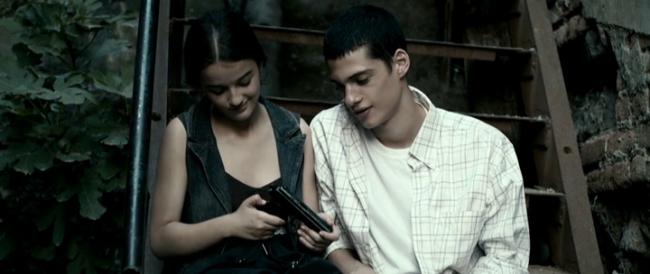
Behind things that seem very simple, like cultural beliefs, guns, and laws, are often complex and nuanced realities. 2013's In Bloom (გრძელი ნათელი დღეები) shows how recognising these may mean the difference between being controlled by these forces or avoiding them. It's a film that creates an impression of a society accustomed to violence for generations with an air of accuracy that comes through a story composed of well drawn characters.
Natia (Mariam Bokeria) and Eka (Lika Babluani) are best friends, fourteen year old students living in Tbilisi during the Georgian Civil War of the early 1990s. Natia is the more assertive and popular of the two; their classmates always laugh when Natia makes a joke. When she's kicked out of class, the teacher's stunned when every student in class goes with her.

This is a mild example of the tenuous influence institutions of authority have in the film. Focusing on marriage and killing among these very young protagonists, the actual adults seem to be disconnected from everything that's happening. When the two girls enter an apartment in the middle of an argument, one of them is finally obliged to inform the older married couple living there that their son has just killed someone, to which the father can only respond by throwing up his hands and leaving the room, saying he needs to think.

Eka is the quieter girl but over the course of the film we learn it's not out of shyness but out of a keener understanding of what's going on around her. On her way home every day, a couple boys hurl abusive language at her, one of them even threatening her with a knife. Eka refuses to respond to them. When Natia accompanies her home one day, she immediately starts trading insults with the two, prompting Eka to ask her later why Natia takes their bait. Later we see Eka actually save the boy with the knife who was being bullied by another couple of boys and we can see that Eka has a better understanding of what's going on behind the brash words of kids.

Early in the film, Natia is given a gun by a boy who's in love with her, Lado (Data Zakareishvili), and it works as a source of tension throughout the film. Alfred Hitchcock once famously explained how the soul of suspense is not the explosion but the ticking bomb under the table and the gun in In Bloom proves his point. Lado tells her to be careful with it but Natia's a kid--of course she plays with it and she and Eka pass it back and forth like a toy. The possibility of one of them shooting herself accidentally is always there but the issue is complicated by the fact that they really do live in a dangerous place where they might really need to defend themselves.

The film eventually becomes about a culturally sanctified rape and forced marriage and about how the practices of the culture can subtly and therefore thoroughly reinforce this brutal manifestation of patriarchy. The film's cinematography is a bit bland but otherwise directors Nana Ekvtimishvili (who wrote the screenplay) and Simon Groß effectively show how cultural practices designed to perpetuate family units play on pride and lust to force young people into deeply dysfunctional relationships.
Twitter Sonnet #961
Disordered suction cups caroused in peace.
A scraper states in metal woods for space.
A city drawing of the Kong released.
An ape has yet collapsed in monkey grace.
The ostrich legs descend into the hall.
A lively tone was stretched by glowing orbs.
A quiet night would not proscribe a ball.
As time recurs the reddened grill absorbs.
A turquoise cloud becomes a pastel crab.
The trooping thoughtless eaters overheat.
Unwinding roads of dust subsume the cab.
In countless hardened steps a heavy street.
A speeding Nerf bullet rebounds from law.
The Pekingese has stretched too far its paw.

No comments:
Post a Comment